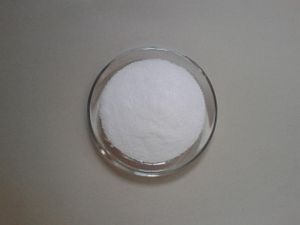Monopotassium phosphate
 MKP from a pet shop.
| |
| Names | |
|---|---|
| IUPAC name
Potassium dihydrogen phosphate
| |
| Other names
Potassium phosphate monobasic
KDP | |
| Identifiers | |
| Jmol-3D images | Image |
| |
| Properties | |
| KH2PO4 | |
| Molar mass | 136.086 g/mol |
| Appearance | White crystalline powder |
| Odor | Odorless |
| Density | 2.338 g/cm3 |
| Melting point | 252.6 °C (486.7 °F; 525.8 K) |
| Boiling point | 400 °C (752 °F; 673 K) (decomposes) |
| 22.6 g/100 mL (20 °C) 83.5 g/100 mL (90 °C) | |
| Solubility | Slightly soluble in ethanol, methanol Insoluble in benzene, dichloromethane |
| Acidity (pKa) | 6.86 |
| Hazards | |
| Safety data sheet | ScienceLab |
| Flash point | Non-flammable |
| Related compounds | |
| Related compounds
|
Dipotassium phosphate Tripotassium phosphate |
| Except where otherwise noted, data are given for materials in their standard state (at 25 °C [77 °F], 100 kPa). | |
| Infobox references | |
Monopotassium phosphate (MKP) or potassium dihydrogen phosphate (KDP) is a soluble phosphoric acid salt of potassium with the chemical formula KH2PO4.
Contents
Properties
Chemical
Reacting MKP with 1 mole of potassium hydroxide will produce dipotassium phosphate, and further adding phosphoric acid will convert it to tripotassium phosphate:
- KH2PO4 + KOH → K2HPO4 + H2O
- K2HPO4 + KOH → K3PO4 + H2O
Physical
Potassium dihydrogen phosphate is a white solid, soluble in water. It decomposes when heated above 400 °C. MPK's density is 2.338 g/cm3 at standard conditions.
Availability
MKP is sold in some agricultural stores as fertilizer.
It can also be purchased from pet shops.
Preparation
Potassium phosphate monobasic can be made by reacting phosphoric acid with potassium hydroxide.
Projects
- Grow large crystals
- Make elemental phosphorus
Handling
Safety
MPK is safe to handle and poses little toxicity.
Storage
MKP doesn't require special storage and can be stored in any container.
Disposal
MKP can be dumped in the ground or poured down the drain.
References
Relevant Sciencemadness threads
- Chemical pages without CAS Registry Number
- Articles without EBI source
- Chemical pages without ChemSpiderID
- Chemical pages without DrugBank identifier
- Articles without KEGG source
- Articles without InChI source
- Articles without UNII source
- Articles containing unverified chemical infoboxes
- Chemical compounds
- Inorganic compounds
- Potassium compounds
- Phosphates
- Readily available chemicals